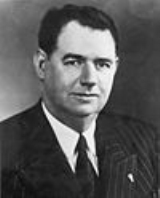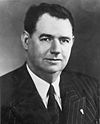
United States Senate election in South Carolina, 1956
Encyclopedia

United States Senate
The United States Senate is the upper house of the bicameral legislature of the United States, and together with the United States House of Representatives comprises the United States Congress. The composition and powers of the Senate are established in Article One of the U.S. Constitution. Each...
from the state of South Carolina
South Carolina
South Carolina is a state in the Deep South of the United States that borders Georgia to the south, North Carolina to the north, and the Atlantic Ocean to the east. Originally part of the Province of Carolina, the Province of South Carolina was one of the 13 colonies that declared independence...
simultaneously with the special senate election
United States Senate special election in South Carolina, 1956
The 1956 South Carolina United States Senate special election was held on November 6, 1956 to select the U.S. Senator from the state of South Carolina simultaneously with the regular senate election. The election resulted from the resignation of Senator Strom Thurmond on April 4, 1956, who was...
. Incumbent Democratic
Democratic Party (United States)
The Democratic Party is one of two major contemporary political parties in the United States, along with the Republican Party. The party's socially liberal and progressive platform is largely considered center-left in the U.S. political spectrum. The party has the lengthiest record of continuous...
Senator Olin D. Johnston
Olin D. Johnston
Olin DeWitt Talmadge Johnston was a Democratic Party politician from the US state of South Carolina. He served as the 98th Governor of South Carolina, 1935–1939 and 1943–1945, and represented the state in the United States Senate from 1945 until his death in 1965.-Early Life, Military Involvement,...
handily defeated Republican
Republican Party (United States)
The Republican Party is one of the two major contemporary political parties in the United States, along with the Democratic Party. Founded by anti-slavery expansion activists in 1854, it is often called the GOP . The party's platform generally reflects American conservatism in the U.S...
mayor of Clemson
Clemson, South Carolina
Clemson is a college town located in Pickens County in the U.S. state of South Carolina. The population was 11,939 at the 2000 census and center of an urban cluster with a total population of 42,199...
Leon P. Crawford.
Democratic Primary
Olin D. JohnstonOlin D. Johnston
Olin DeWitt Talmadge Johnston was a Democratic Party politician from the US state of South Carolina. He served as the 98th Governor of South Carolina, 1935–1939 and 1943–1945, and represented the state in the United States Senate from 1945 until his death in 1965.-Early Life, Military Involvement,...
, the incumbent Senator
United States Senate
The United States Senate is the upper house of the bicameral legislature of the United States, and together with the United States House of Representatives comprises the United States Congress. The composition and powers of the Senate are established in Article One of the U.S. Constitution. Each...
, faced no opposition from South Carolina Democrats
South Carolina Democratic Party
The South Carolina Democratic Party is the South Carolina affiliate of the United States Democratic Party. The Democratic party thrived during the Second Party System between 1832 and the mid-1850s and was one of the causes of the collapse of the Whig Party....
and avoided a primary election
Primary election
A primary election is an election in which party members or voters select candidates for a subsequent election. Primary elections are one means by which a political party nominates candidates for the next general election....
.
Republican Primary
Leon P. Crawford, the mayor of the town of ClemsonClemson, South Carolina
Clemson is a college town located in Pickens County in the U.S. state of South Carolina. The population was 11,939 at the 2000 census and center of an urban cluster with a total population of 42,199...
in the Upstate
The Upstate
The Upstate is the region in northwestern South Carolina, United States, also known as The Upcountry, which is the historical term. Although loosely defined among locals, the general definition includes the 10 counties of the commerce-rich I-85 corridor in the northwest corner of South Carolina. ...
, faced no opposition from South Carolina Republicans
South Carolina Republican Party
The South Carolina Republican Party and the South Carolina Democratic Party are the two major political parties within the U.S. state of South Carolina...
and avoided a primary election
Primary election
A primary election is an election in which party members or voters select candidates for a subsequent election. Primary elections are one means by which a political party nominates candidates for the next general election....
.
General election campaign
Crawford campaigned as a defender of states' rightsStates' rights
States' rights in U.S. politics refers to political powers reserved for the U.S. state governments rather than the federal government. It is often considered a loaded term because of its use in opposition to federally mandated racial desegregation...
and denounced Johnston for backing the New Deal
New Deal
The New Deal was a series of economic programs implemented in the United States between 1933 and 1936. They were passed by the U.S. Congress during the first term of President Franklin D. Roosevelt. The programs were Roosevelt's responses to the Great Depression, and focused on what historians call...
and the Fair Deal
Fair Deal
The Fair Deal was the term given to an ambitious set of proposals put forward by United States President Harry S. Truman to the United States Congress in his January 1949 State of the Union address. The term, however, has also been used to describe the domestic reform agenda of the Truman...
. The state Republican Party believed that Crawford could have a chance in the election if he galvanized the 128,000 registered black voters, although they were weary of being labeled as the black party. In the end, Johnston remained highly popular with the voters who were still leery of the Republican party and he easily defeated Crawford in the general election.
Election results
| colspan=5 |Democratic
Democratic Party (United States)
The Democratic Party is one of two major contemporary political parties in the United States, along with the Republican Party. The party's socially liberal and progressive platform is largely considered center-left in the U.S. political spectrum. The party has the lengthiest record of continuous...
hold
|-
See also
- List of United States Senators from South Carolina
- United States Senate elections, 1956
- United States Senate special election in South Carolina, 1956United States Senate special election in South Carolina, 1956The 1956 South Carolina United States Senate special election was held on November 6, 1956 to select the U.S. Senator from the state of South Carolina simultaneously with the regular senate election. The election resulted from the resignation of Senator Strom Thurmond on April 4, 1956, who was...

